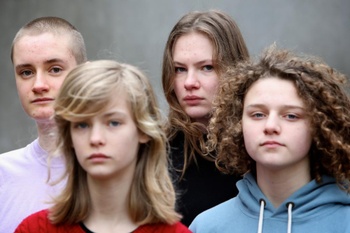The Bechdel test is used to test whether fiction (films, books, theatre) is sexist. You pass the test if there are at least two named female characters who speak to one another about something other than “men”. Passing the Bechdel Test by choreographer/theatre maker Jan Martens passes with flying colours.
© Clara Hermans
In 1985, American illustrator Alison Bechdel wrote the one-page comic The Rule as part of her long-term series Dykes to Watch Out For. In that comic, one character formulates what later feminists would later actually start employing as the Bechdel test described above. The new piece by choreographer Jan Martens (The Dog Days Are Over, The Common People, and Rule of Three), a collaboration between his own choreographic platform GRIP and the Leuven-based company fABULEUS, has no trouble passing the test whatsoever. Thirteen F/X young people between fourteen and nineteen years old compile an anthology of texts (in Dutch, French, and English, with subtitles in each of those languages) onstage by writers who are role models, like Virginia Woolf, Jeanette Winterson, Susan Sontag, Rebecca Solnit, Toni Morrison, Maggie Nelson, and Audre Lorde.
“The idea of collaborating with fABULEUS to make a production with young people had been around for a while, and I wanted to involve lesbian girls,” Jan Martens explains. “On the one hand, that is because I identify with their experience because I am a homosexual myself, but on the other hand I don’t because there are not so many contacts between gay men and lesbians, and of course this is a younger generation. I wanted to explore the diversity within that subgroup, which is often incorrectly perceived as a homogeneous group.”
“Over the past year, I have become more conscious of feminist issues. The #metoo movement has of course played a significant role. I had already read about the Bechdel test and about the fact that 80 percent of reading lists in schools consist of male authors. So we started thinking about drawing up an alternative canon and to see which important texts are not reaching a broad audience. So two years ago, I decided to start reading only female authors.”
Two years ago I decided to start reading only female authors

And the auditions started a year ago.
Jan Martens: We launched a call for what we called F/X young people: young people who are lesbian, bisexual, queer, or just interested in the theme. About eighty young people responded, from Bredene to Genk so to speak, and that resulted in a very cosy and informative encounter. There was a lot of affinity but also diversity. There were sixteen-year-old girls who have been out of the closet for the past five years, but there were also nineteen-year-olds who are still struggling with their sexual identity.
We did not begin rehearsals immediately, but first invited people to speak, for example a lesbian couple who have lived together in Heist-op-den-Berg since the 1980s, Bieke Purnelle from RoSa, the knowledge centre for gender and feminism, or Heleen Declercq, who had just graduated from RITCS with the short film Girlhood. We organized group conversations and read a lot of texts that were later included in the show.
Is there a lack of role models for F/X young people or is the problem that certain voices do not receive sufficient attention?
Martens: There are definitely an increasing number of role models. Ellen Page, who came out two years ago, or even Ellen DeGeneres, who is somewhat older, are very important figures for them. But it is indeed important to make certain texts visible again. I myself was amazed to realize the number of books I had never read because they were apparently not considered important enough. Authors like Audre Lorde wrote about radically progressive ideas in the 1980s, but we were never confronted with them in school. The young people who are now on the stage are the future. They can transmit insights from past generations to a new generation so that everyone knows what has already been said. As long as that has not happened, like author Niña Weijers, we have to “keep hammering”.

Passing the Bechdeltest, een performance door Jan Martens.
What was the main message that the young people wanted to convey?
Martens: You will hear a plethora of voices. Not everyone supports each selected fragment to the same extent. Nor do I. But our objective is not to proclaim a truth. Feminism has always had a great diversity of voices over the years. In the 1960s, Betty Friedan wrote that lesbians were not part of the feminist struggle, which according to her was between men and women. Whereas nowadays intersectionality is the key term and in addition to gender, race, class, and background are also considered. The women we highlight all made different choices. When she was sixteen, Susan Sontag wrote in her diary about how she first explored the gay scene in San Francisco, spent the night with a girl, and was then determined to ban all intellectualism from her life so they she could devote herself to living and feeling. But we know that she would later do both. We want to show what the options are to take control of your own life without anybody else pushing you in any particular direction. That idea of self-determination is very important.
Listening to all of this, it doesn’t sound like a dance production.
Martens: No, if that is what you are expecting, you will be disappointed. I look for the right form for each piece. Due to my training, it is often dance-related, but now it is an invitation to listen. It is text, text, and text that we want to present in the clearest possible way. In some cases, it is clear who wrote a certain text, but in other cases it is not, but at the end everyone will be given a brochure with all the sources.
> Passing the Bechdel Test. 14 & 15/11, 20.30, Beursschouwburg
Read more about: Podium
Fijn dat je wil reageren. Wie reageert, gaat akkoord met onze huisregels. Hoe reageren via Disqus? Een woordje uitleg.